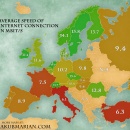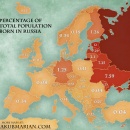 |
Comma before ‘and’, ‘but’, ‘so’, etc., between independent clauses
Most languages don’t require a comma before “and” when it joins two independent clauses, but writing a comma before “but”, (...)
August 24, 2015 – Jakub Marian – English
|
 |
Average Internet connection speed by country in Europe
Akamai, a huge content delivery network (CDN), regularly publishes statistical data on various aspects of Internet connection in the (...)
August 19, 2015 – Jakub Marian – Maps
|
 |
‘I feel myself good’ and ‘I feel myself well’ in English
A common error among beginning English speakers is to say “I feel myself” instead of “I feel”, which is understandable because this is the (...)
August 16, 2015 – Jakub Marian – English
|
 |
‘He wents’ vs. ‘he went’ in English
English is a very simple language when it comes to the past tense. Every verb in English (apart from “to be”) has only one simple past (...)
August 16, 2015 – Jakub Marian – English
|
 |
Comma before ‘whereas’, ‘while’, and ‘although’
Should you precede a subordinate clause with a comma? This depends on whether the subordinate clause contains essential information that (...)
August 9, 2015 – Jakub Marian – English
|
By the way, have you already seen my brand new web app for non-native speakers of English? It's based on reading texts and learning by having all meanings, pronunciations, grammar forms etc. easily accessible. It looks like this:
 |
‘In the future’ vs. ‘in future’ in British and American English
“Future” can be either an adjective or a noun. When used as an adjective, it doesn’t take any article itself; it is preceded by the (...)
August 6, 2015 – Jakub Marian – English
|
 |
Russian immigration in Europe (map)
The following map shows the percentages of residents of European countries who were born in Russia (i.e. first-generation immigrants of (...)
July 29, 2015 – Jakub Marian – Maps
|
 |
‘So to say’ vs. ‘so to speak’ in English
Both “so to speak” and “so to say” (meaning “as one might say”) can be found in English literature and English dictionaries. However, take (...)
July 25, 2015 – Jakub Marian – English
|
 |
Comma after ‘i.e.’ and ‘e.g.’
The abbreviations i.e. (which means “that is” or “in other words”, from Latin id est) and e.g. (which means “for example”, from Latin (...)
July 19, 2015 – Jakub Marian – English
|
 |
‘Compare to’ vs. ‘compare with’ in English
Some authors claim that “compare to” and “compare with” mean essentially the same, but this is not supported by actual data. The verb (...)
July 12, 2015 – Jakub Marian – English
|
